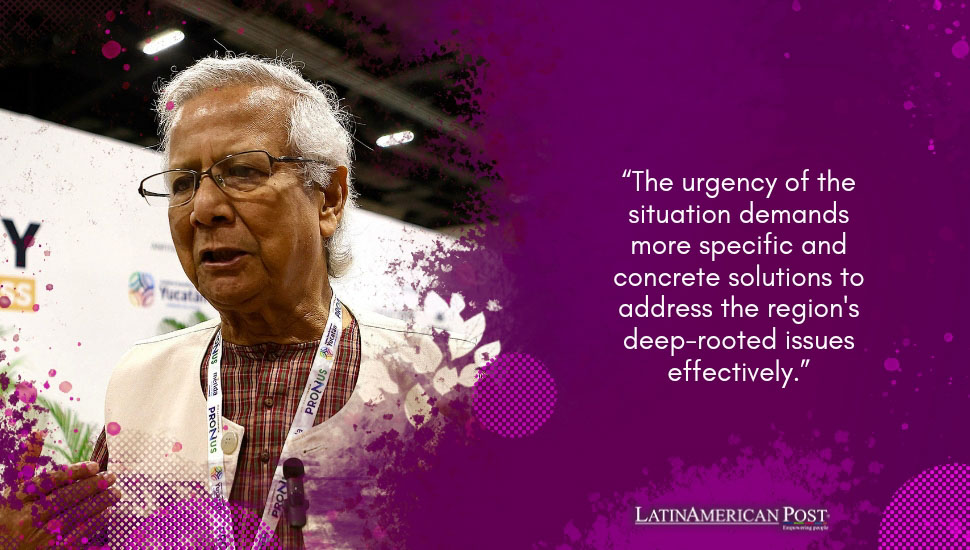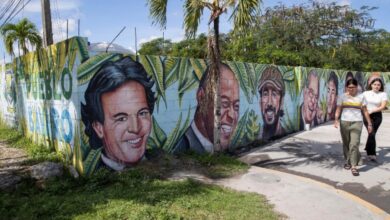Concrete Solutions Needed to Tackle Poverty and Inequality in Latin America

While Nobel Laureate Muhammad Yunus’s call to dismantle social and financial barriers in Latin America inspires, the urgency of the situation demands more specific and concrete solutions to address the region’s deep-rooted issues effectively.
Nobel Peace Prize winner Muhammad Yunus has been a beacon of hope for those advocating for poverty alleviation through innovative financial solutions. His call to dismantle social and financial barriers in Latin America resonates deeply in a region plagued by economic disparities and social inequalities. However, while Yunus’s vision is laudable, it needs concrete and specific solutions tailored to the unique challenges of Latin America.
Yunus emphasizes the importance of breaking down barriers to financial services, healthcare, and education. These are indeed crucial areas that require attention. Yet, broad statements about the need for change do not translate into actionable policies. Latin America needs targeted interventions that address the structural issues perpetuating poverty and inequality.
For instance, Yunus’s successful microfinance model in Bangladesh can serve as a blueprint, but it must be adapted to the unique socio-economic landscape of Latin America. Factors such as regulatory environments, cultural attitudes towards credit, and existing financial infrastructures must be considered for these solutions to be effective.
Furthermore, the emphasis on financial inclusion must be accompanied by robust regulatory frameworks. These frameworks are crucial to prevent exploitation and ensure that microloans do not become a new form of financial bondage. Clear guidelines on interest rates, repayment terms, and borrower protections are essential to safeguard the interests of low-income borrowers.
Addressing Healthcare and Education Barriers
Yunus rightly identifies healthcare and education as critical areas needing reform. However, more than vague calls for improvement are required. Latin America requires specific strategies to enhance access and quality in these sectors.
For instance, a concrete solution in healthcare could involve implementing universal healthcare systems tailored to each country’s needs. This includes increasing investment in healthcare infrastructure, training more medical professionals, and ensuring equitable distribution of healthcare resources. Telemedicine could also play a significant role in reaching remote and underserved populations, but this requires investment in digital infrastructure and literacy programs.
In education, targeted initiatives to improve quality and access are essential. Governments should focus on building and maintaining schools in rural and marginalized areas, providing teacher training programs, and integrating technology into the classroom to enhance learning outcomes. Additionally, implementing scholarship programs and financial aid for students from low-income families can help bridge the education gap.
Fostering Economic Opportunities
Economic opportunity is another area where Latin America needs specific and actionable plans. Yunus’s advocacy for social business is a step in the right direction, but more detailed strategies are required to create sustainable economic growth.
One concrete solution is to develop and support small and medium-sized enterprises (SMEs) through grants, low-interest loans, and business development services. These businesses are often the backbone of local economies and can drive job creation and economic resilience. Governments should create favorable environments for SMEs by reducing bureaucratic red tape, providing tax incentives, and facilitating access to markets.
Additionally, vocational training programs tailored to market needs can equip the workforce with the skills required in growing industries. This approach not only addresses unemployment but also ensures that businesses have access to skilled labor, fostering a cycle of economic growth and stability.
Leveraging Technology for Development
Technological innovation is a powerful tool for addressing poverty and inequality, yet its potential still needs to be utilized in many parts of Latin America. Concrete actions to integrate technology into development efforts can yield significant benefits.
For instance, digital financial services can expand access to banking for the unbanked population, allowing them to save securely, access credit, and make transactions. Governments and financial institutions should collaborate to create and promote digital banking platforms that are user-friendly and accessible to all, including those in remote areas.
Precision farming technologies can help small farmers increase productivity and reduce costs. Providing farmers with access to affordable technologies, coupled with training programs, can significantly improve agricultural output and livelihoods. Furthermore, creating digital marketplaces can connect farmers directly with consumers, eliminating middlemen and increasing farmers’ profit margins.
Promoting Social Inclusion and Equality
Social inclusion and equality are fundamental to sustainable development. While Yunus calls for dismantling barriers, specific measures are needed to promote social equity actively.
One approach is to implement comprehensive social protection programs that provide safety nets for the most vulnerable populations. These programs could include unemployment benefits, disability support, and old-age pensions, ensuring no one is left behind.
Furthermore, policies aimed at reducing gender disparities are crucial. Empowering women through access to education, healthcare, and economic opportunities can have transformative effects on communities. Governments should enforce laws against gender discrimination, promote women’s participation in the workforce, and support women-owned businesses.
Strengthening Governance and Accountability
Good governance and accountability are essential for implementing and sustaining effective development policies. Concrete actions to improve governance include strengthening institutions, enhancing transparency, and promoting citizen participation.
Governments should invest in building robust public institutions that can deliver services efficiently and fairly. This includes anti-corruption measures, transparent procurement processes, and mechanisms for public accountability. Encouraging citizen engagement through participatory budgeting and community oversight can also ensure that development initiatives reflect the people’s needs and priorities.
Also read: U.S. Neglect of Latin America Paves the Way for BRICS Strength
Muhammad Yunus’s vision for dismantling social and financial barriers in Latin America is inspirational, but inspiration alone is not enough. The region requires specific, concrete solutions to address its complex and multifaceted challenges. By focusing on targeted interventions in healthcare, education, economic opportunity, technology, social inclusion, and governance, Latin America can make significant strides toward reducing poverty and inequality. These solutions have the potential to transform vision into reality, offering hope for a brighter future.





